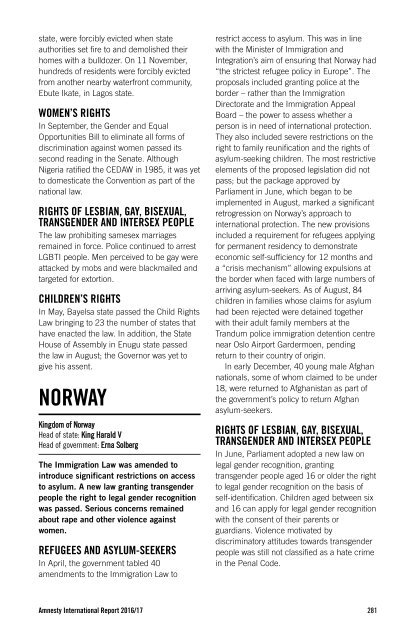AMNESTY INTERNATIONAL REPORT 2016/17
2lEHU9j
2lEHU9j
You also want an ePaper? Increase the reach of your titles
YUMPU automatically turns print PDFs into web optimized ePapers that Google loves.
state, were forcibly evicted when state<br />
authorities set fire to and demolished their<br />
homes with a bulldozer. On 11 November,<br />
hundreds of residents were forcibly evicted<br />
from another nearby waterfront community,<br />
Ebute Ikate, in Lagos state.<br />
WOMEN’S RIGHTS<br />
In September, the Gender and Equal<br />
Opportunities Bill to eliminate all forms of<br />
discrimination against women passed its<br />
second reading in the Senate. Although<br />
Nigeria ratified the CEDAW in 1985, it was yet<br />
to domesticate the Convention as part of the<br />
national law.<br />
RIGHTS OF LESBIAN, GAY, BISEXUAL,<br />
TRANSGENDER AND INTERSEX PEOPLE<br />
The law prohibiting samesex marriages<br />
remained in force. Police continued to arrest<br />
LGBTI people. Men perceived to be gay were<br />
attacked by mobs and were blackmailed and<br />
targeted for extortion.<br />
CHILDREN’S RIGHTS<br />
In May, Bayelsa state passed the Child Rights<br />
Law bringing to 23 the number of states that<br />
have enacted the law. In addition, the State<br />
House of Assembly in Enugu state passed<br />
the law in August; the Governor was yet to<br />
give his assent.<br />
NORWAY<br />
Kingdom of Norway<br />
Head of state: King Harald V<br />
Head of government: Erna Solberg<br />
The Immigration Law was amended to<br />
introduce significant restrictions on access<br />
to asylum. A new law granting transgender<br />
people the right to legal gender recognition<br />
was passed. Serious concerns remained<br />
about rape and other violence against<br />
women.<br />
REFUGEES AND ASYLUM-SEEKERS<br />
In April, the government tabled 40<br />
amendments to the Immigration Law to<br />
restrict access to asylum. This was in line<br />
with the Minister of Immigration and<br />
Integration’s aim of ensuring that Norway had<br />
“the strictest refugee policy in Europe”. The<br />
proposals included granting police at the<br />
border – rather than the Immigration<br />
Directorate and the Immigration Appeal<br />
Board – the power to assess whether a<br />
person is in need of international protection.<br />
They also included severe restrictions on the<br />
right to family reunification and the rights of<br />
asylum-seeking children. The most restrictive<br />
elements of the proposed legislation did not<br />
pass; but the package approved by<br />
Parliament in June, which began to be<br />
implemented in August, marked a significant<br />
retrogression on Norway’s approach to<br />
international protection. The new provisions<br />
included a requirement for refugees applying<br />
for permanent residency to demonstrate<br />
economic self-sufficiency for 12 months and<br />
a “crisis mechanism” allowing expulsions at<br />
the border when faced with large numbers of<br />
arriving asylum-seekers. As of August, 84<br />
children in families whose claims for asylum<br />
had been rejected were detained together<br />
with their adult family members at the<br />
Trandum police immigration detention centre<br />
near Oslo Airport Gardermoen, pending<br />
return to their country of origin.<br />
In early December, 40 young male Afghan<br />
nationals, some of whom claimed to be under<br />
18, were returned to Afghanistan as part of<br />
the government’s policy to return Afghan<br />
asylum-seekers.<br />
RIGHTS OF LESBIAN, GAY, BISEXUAL,<br />
TRANSGENDER AND INTERSEX PEOPLE<br />
In June, Parliament adopted a new law on<br />
legal gender recognition, granting<br />
transgender people aged 16 or older the right<br />
to legal gender recognition on the basis of<br />
self-identification. Children aged between six<br />
and 16 can apply for legal gender recognition<br />
with the consent of their parents or<br />
guardians. Violence motivated by<br />
discriminatory attitudes towards transgender<br />
people was still not classified as a hate crime<br />
in the Penal Code.<br />
Amnesty International Report <strong>2016</strong>/<strong>17</strong> 281


